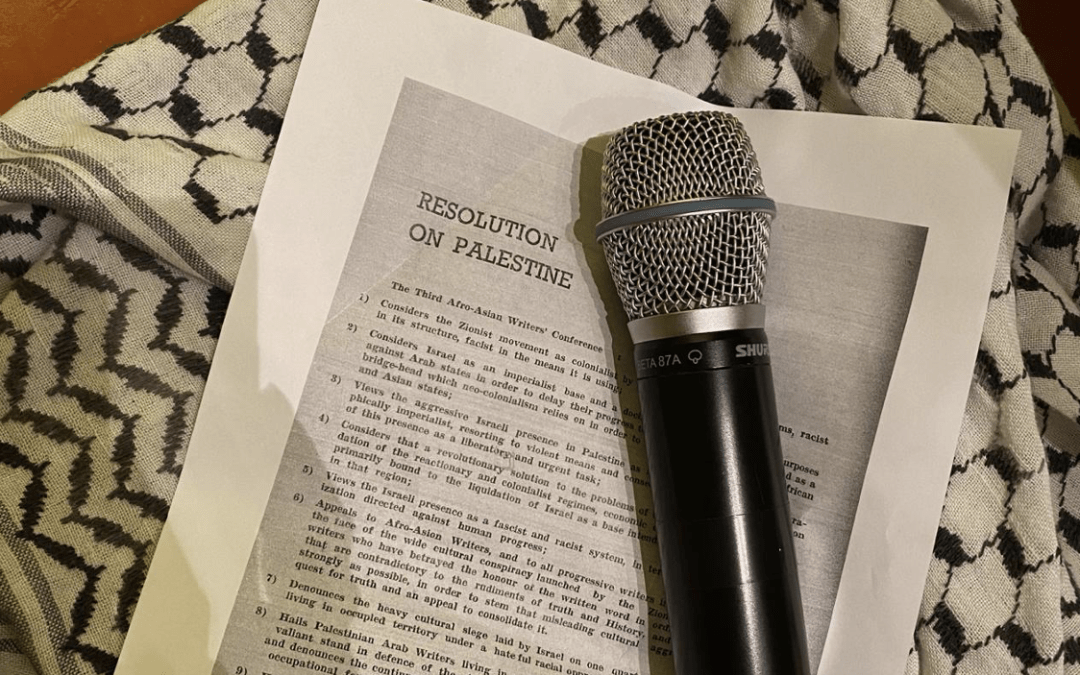Nancy Slim | Staff Writer
For Palestine Week, the English and Arabic Student Societies in collaboration with the literary and art journal, Rusted Radishes, hosted an open mic night: Readings from Beirut to Palestine. The emotionally dense night took place at Charles Hostler Auditorium on March 8th at 6 PM, with the audience adorned with their kuffiyahs and armed with their belief in the power of words.
As the vice president of the English Students Society myself, I was honoured to host the event alongside the president of the Arabic Students Society, Sara Tello. The open mic night was hosted not only to mourn our martyrs but also to celebrate the Palestinian resistance and the life of its people. So, we extend our thanks to the Palestine Land Studies Centre and the Palestine Week committee at the American University of Beirut for the opportunity to host this event, as well as Rusted Radishes for their collaboration.
With a heavy heart, we remember those who were murdered, for they are not mere numbers on a death toll list. As Ghassan Kanafani once said “bodies fall, but the ideas persist”, and we gathered on March 8th to share and celebrate these ideas as expressions of resistance through our words, stories, and poetry.
To find the ray of light amidst the darkness that has been surrounding us not for the past six months but for the past seventy-six years. We joined together in solidarity to honor Palestine, a nation that despite its tremendous suffering still persists because resistance through art is the way we leave our mark on history and alter its course. Through art, we teach life, we water the olive trees, we send a letter to the world, and we make our voices heard: our existence stems from our resistance.
After the hosts commenced the night with their welcoming speeches, Dr. Rima Rantisi offered a moving speech about the importance of language and literature in resistance, followed by excerpts from authors who published their pieces in Rusted Radishes. Then, the readings launched in both languages, Arabic and English, ranging from original pieces by students and faculty to poems and essay excerpts by May Ziadeh.
Providing historical and cultural context, Ziadeh’s excerpts served as a reminder from the past that links us to what is currently happening in Gaza. Likewise, Dr. Ramy Zurayk brought light to the night by reading Abeer Jabaji’s poems that have been recently published as a reaction to the ongoing genocide in Gaza.
Also, Dr. Tariq Mehmood Ali shared a resolution on Palestine that was drafted at the third Afro-Asian Writers’ conference, which is still relevant to our day. What is different from the time this resolution was drafted and nowadays is that, during that time the resolution straightforward called out Zionists for what they are: colonialist thieves. However, if we so much as call for a free Palestine today, we are labelled as extreme antisemitic people. The concept is still the same throughout history, if not escalating in brutality, yet the censoring has gotten more intensely strict. It even trespasses the boundaries of censorship into social and legal repercussions, making injustice horridly spread without shame.
Throughout the night, readers continued to evoke our emotions by reciting pieces by Mahmoud Darwish, Abeer Jabaji, and Rafeef Ziadeh which brought the audience to tears, as well as the readers themselves. That is proof enough as to how powerful the written and spoken words are. We may not have the artillery and weapons to free Palestine, but we do have our words. And words and ideas can and will change the world. The open mic night was a tremendous success because of everyone who believed in the power of words and attended as mere listeners or participated as readers; together we celebrated our resistance and solidarity in the face of brutal injustice.
And may we celebrate the next time we gather, from the river to the sea, a Palestine forever free.

